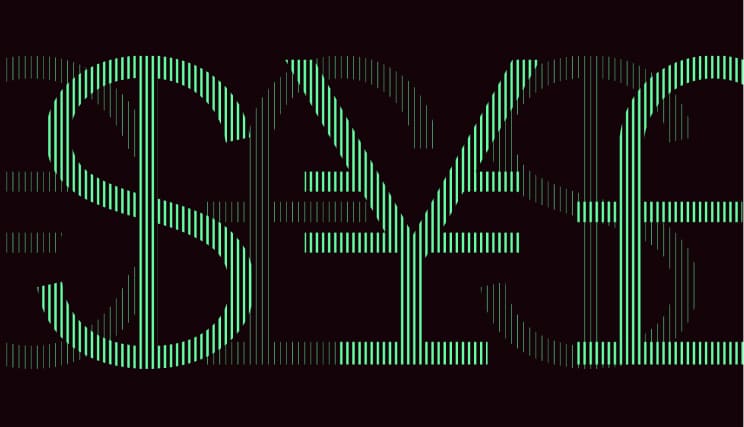Gain an overview of the latest developments on the currency market and anticipate fluctuation risks.
Against the tide
It is in the very nature of financial markets to get carried away with exuberance. This is what is happening with the US dollar, in our view. Since October, the market has been short the dollar. There are several reasons for this: the expected slowdown in US growth next year, productivity problems, the twin deficit and, above all, expectations of policy rate cuts starting in the second quarter. None of these arguments appear solid enough to us to justify the greenback’s steep depreciation. We think a market correction is inevitable and the strong dollar era is by no means over.
EUR/USD
High: 1.1011 Low: 1.0555 Change: +3.48%
We consider the euro’s current strength against the US dollar to be an anomaly. The fact that the euro is so high is not due to renewed confidence in the European economy but to a broad-based depreciation of the dollar because of expectations of rate cuts by the US Federal Reserve (Fed). In our view, at least three factors warrant caution about the current level of the European single currency: 1) the euro is overvalued relative to the EU’s economic fundamentals; 2/ the market anticipates a first rate cut by the US Federal Reserve in the second quarter of 2024, but this is far from certain. It may intervene later, potentially even after the European Central Bank; and 3) the widening of yield differentials in the European bond market, especially between Germany and Italy, calls for caution. As such, we think the euro may not escape a potential correction in the coming days or weeks given that a large part of its appreciation in recent weeks has no solid basis
EUR/GBP
High: 0.8765 Low: 0.8647 Change: -0.93%
Based on the real effective exchange rate, which gives an idea of whether a currency is undervalued or overvalued, sterling appears somewhat overvalued. But this does not mean this currency is about to undergo a correction. In the medium term, we think the EUR/GBP pair will continue be marked by low volatility. We expect it to return to the zone around 0.85 in the months ahead. Consequently, there is not much new to say about this pair, which has been very stable for many years.
GBP/USD
High: 1.2716 Low: 1.2119 Change: +4.37%
The GBP/USD pair has been in a consolidation phase, but this is now over. The broad-based depreciation of the US dollar, reflecting expectations of rate cuts by the US Federal Reserve starting in the second quarter of 2022, has also affected the pair. In view of sterling’s appreciation over the past month (+4.37%), we would not be surprised if the market staged a correction before the end of the year. Indeed, we are highly sceptical about the current stampede by institutional investors and traders to sell the US dollar. We do not think this is movement is solid and there is consequently a high risk of a correction.
EUR/CNH
High: 7.8894 Low: 7.7224 Change: +1.38%
The CNH continues to appreciate, gaining 1.38% over the past month. Market operators are more optimistic today about the Chinese macroeconomy, especially after encouraging import figures pointing to a recovery in domestic demand. The recovery in recent weeks is likely to encourage Chinese exporters to increase their sale of dollars, and this should continue to drive up the CNH, including against the euro.
EUR/CHF
High: 0.9688 Low: 0.9585 Change: +0.18%
There has been little activity on the EUR/CHF pair, which fluctuated in November within an extremely narrow range of just 100 pips. There is no volatility. The Swiss National Bank (SNB), which had often intervened in the currency market, is no longer doing so (or only for routine operations not designed to influence the Swiss franc’s direction). And there is nothing to be expected from the SNB’s meeting this month. We expect the EUR/CHF pair to move within a narrow range of between 0.85 and 0.87 throughout most of 2024.
EUR/CAD
High: 1.5039 Low: 1.4586 Change: +1.67%
No monetary policy changes are in the pipeline in the short term. The terminal rate has been reached in both Canada and the eurozone. The market has had a long position on the euro for several weeks. We think the upward trend still has some additional potential. Note in particular that the Canadian dollar is penalised by lower oil prices than the market was expecting.
EUR/AUD
High: 1.6832 Low: 1.6467 Change: -0.53%
The ongoing disinflation process in Australia will probably persuade the Reserve Bank of Australia to leave its monetary policy unchanged in the short term. It is even likely that the terminal rate has already been attained. In other words, monetary policy should no longer be a differentiating factor for the pair. We still think the euro has upside potential against the Australian dollar, mainly because of stronger economic momentum. But it seems the market does not share our opinion at present.
EUR/JPY
High: 164.32 Low: 157.69 Change: +2.10%
The depreciation of the Japanese yen continues – what else is new? In contrast with the euro, clearly overvalued, the yen is unquestionably deeply undervalued. This is also true of the Norwegian crown. But we still do not see what could put a lasting brake on the Japanese currency’s decline given that the Bank of Japan is unlikely to modify its monetary policy at its meeting on 18 and 19 December. In other words, the yen will probably come under continued sell-side pressure in the short term.
EUR/HUF
High: 384.23 Low: 375.66 Change: -1,22%
Hungary continues to pursue its monetary loosening policy with a new policy rate cut of 75 basis points in November, the same as that in October. We expect the Hungarian central bank to continue down this path with further 75 basis point cuts in the coming months. Somewhat surprisingly, this does not seem to be influencing the trajectory of the HUF. It appears that the predictability of Hungary’s monetary policy is a strength for the currency at present.
USD/HUF
High: 365.11 Low: 342.29 Change: -4.45%
The currency market has been short on the US dollar for approximately the past two months, explaining the steep drop in the USD/HUF pair in November (-4.45%). We think this downward trajectory is excessive and a market correction cannot be ruled out since the main argument driving this depreciation – expectations of rate cuts by the Federal Reserve – is surely mistaken. The Fed has made it clear that rates are set to remain high for an extended period. The market continues to expect a rate cut in the second quarter of 2024. One of them is mistaken, and we think it is the market. This is why we think a rally by the dollar would not be surprising.
Economic Calendar
| DATE | CURRENCY | EVENT |
| 07-08/12 | EUR | China-EU summit |
| 08/12 | USD | Employment report and US unemployment in November |
| 12/12 | USD | US inflation figure in November |
| 13/12 | USD |
Central bank meeting
|
| 14/12 | CHF |
Central bank meeting |
| 14/12 | EUR |
Central bank meeting |
| 17/12 | HUF |
Central bank meeting |
| 18-19/12 | JPY |
Central bank meeting |
Topics




